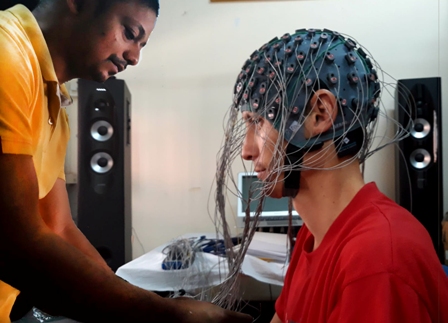
It’s been a mystery as to why a person listens to sad music during his sadness but researchers of Indian Institute of Technology (IIT) Mandi have tried to explore the mystery by carrying out research on the subject.
Music has a powerful ability to affect our emotions and people often turn to music to bolster their mood and get through a tough time, but why people turn to sad music to overcome sadness has been a riddle called tragedy paradox.
It has been believed the tragedy paradox is an effect of aesthetic appeal of sad music but the researchers have tried to explore the subject further.
Prof. Laxmidhar Behara, Director of the institute, who is closely associated with the research said, “We wanted to find out how the brain reacts when listening to sad music after having an adverse experience or memory? For which the researchers used electroencephalography (EEG) to measure brain activity of twenty people under different conditions focusing on brain regions involved in emotion and memory processing: the cingulate cortex complex and the par hippocampus”.
He tells, “We selected twenty participants having no training of music (to avoid pre-programmed reactions to the selected music) to monitor their EEG in three stages, in the baseline stage with no input, in the second stage writing about their sad memories (sad autobiographical recall) and in the third stage while listening Indian classical Raga – Mishra Jogiya Raga for creating sad emotions.”
“It was found while recalling a sad experience, gamma waves in the brain increased but after listening to sad music alpha waves increased which signifies listening to sad music promotes processing of emotions and memories in the brain through a three channel framework involving alpha brain waves “, he adds .
This mechanism includes increased global and local connectivity in the brain area involved in emotion, memory processing and increased alertness.
“The brain activity while listening to sad music is unique and distinct from both the stages; the coping mechanism of sad music arises from better processing of emotions and memories under the alpha stage which is not merely due to aesthetic appeal of music but an inherent property of sad music”, explains a researcher Ashish Gupta.
These interesting observations have been recently published in the open-access journal PLOS One co-authored by Ashish Gupta, Prof Braj Bhushan, and Prof. Behera.

